Subscribe to R&D Round-Up newsletter
Stay informed with a short, sharp monthly summary of MLA’s latest research reports.
Sheep Reproduction Strategic Partnership (SRSP)

The Sheep Reproduction Strategic Partnership (SRSP) is a sheep industry initiative managed by Meat & Livestock Australia (MLA) that seeks to profitably and sustainably increase lamb production by increasing weaning rates and decreasing mortality.
Building on existing industry research, development and adoption (RD&A), the SRSP will increase impact and scale by:
- focusing on and promoting on-farm best practice management
- working with producers to apply R&D on farm in a way that is practical, economical and works for different business models
- testing and demonstrating supporting technologies
- identifying and filling gaps in R&D.
The SRSP seeks to improve reproductive performance and weaning rates by providing producers with solutions for their farm businesses across the entire reproductive cycle. These will also deliver productivity, animal health and animal welfare benefits.
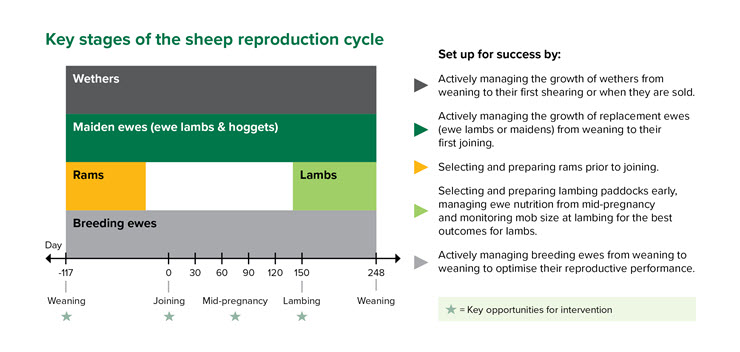
About the partnership
A feature of the SRSP is collaboration between research providers and industry organisations to develop larger, long-term programs of research, development and adoption that address a common goal to deliver greater benefits and impacts for the sheep industry.
The partnership is focused on:
- boosting collaboration and fostering industry networks
- recognising and promoting animal welfare and social benefits
- enhancing the sustainability of the Australian sheepmeat sector
- investing in capacity and capability
- supporting research innovation and producer adoption.
SRSP projects
- Accelerating sheep reproduction best practice
Through demonstration sites, training and peer-to-peer learning across southern Australia, this project is designed to scale up the adoption of sheep reproduction best practice to boost lamb survival and weaning rates.
- Design, establishment and benefits of edible shelter to improve lamb survival and whole-farm profitability
Over 30 research sites, this project will investigate the impacts of different types of edible shelter on the physiology, behaviour, welfare and survival of sheep, along with the nutritional benefits of the feedbase in mixed farming enterprises. This information will provide the basis for recommended shelter design in sheep enterprises.
- Investigating heat stress in ewes
This project aims to definitively and more comprehensively quantify the effects of heat events on sheep reproduction, thermoregulatory capacity, behaviour and wellbeing through long term data collection during a range of climatic conditions in diverse production settings. Outcomes of this research may be used to inform management strategies to minimise the impact of heat stress on reproductive performance.
SRSP RD&A alert
The sheep reproduction RD&A alert provides a monthly snapshot of the latest research, development and adoption initiatives related to improving the reproductive performance of sheep. Contact details for each initiative are provided to encourage communication and collaboration across the sheep reproduction RD&A community.
To receive the SRSP RD&A alert, contact the SRSP program coordinator.
- SRSP Sheep RDA Alert Jan 2021
- SRSP Sheep RDA Alert Feb 2021
- SRSP Sheep RDA Alert Mar 2021
- SRSP Sheep RDA Alert Apr 2021
- SRSP Sheep RDA Alert May 2021
- SRSP Sheep RDA Alert Jun 2021
- SRSP Sheep RDA Alert July 2021
- SRSP Sheep RDA Alert Aug 2021
- SRSP Sheep RDA Alert Sep 2021
- SRSP Sheep RDA Alert Oct 2021
SRSP Webinars
The SRSP will be hosting a quarterly webinar series to present the latest sheep reproduction research and development outcomes.
Can melatonin improve twin lamb survival?
A recent review of the major risk factors for neonatal lamb mortality found that melatonin can improve outcomes in high risk sheep pregnancies through increasing uterine blood flow and neonatal neuroprotection. Dr Will van Wettere from the University of Adelaide discusses the impact of supplementing Merino ewes with melatonin following pregnancy scanning to improve the survival of twin born lambs.
Part 1 :
Reducing ewe mortality during lambing is a high priority for the sheep industry. In part 1 of this webinar, Mary McQuillan from Livestock Logic discusses unlocking the key to ewe survival during lambing and presents the major risk factors affecting ewe mortality.
Part 2:
Part 2 of this webinar, presented by Andre Whale from Livestock Logic, highlights the key fitness indicators to look for when deciding if ewes are fit to join.
Related resources
SRSP management committee
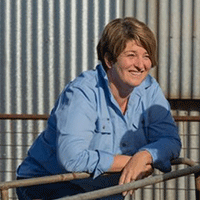
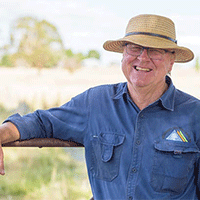
B Rural Science
SALRC Chair
Ian Rogan comes from a beef and dairy cattle farming family in the Clarence River region of northern NSW, and currently runs a nursery and consulting firm in the Central Tablelands of NSW. He has over 40 years of professional experience in both the public and private sectors providing research, development and adoption services for Australian livestock industries. Ian is the Chair of the Southern Australia Livestock Research Council (SALRC) and the Central Tablelands Local Land Services Board.

BSc (Vet Bio) BVMS MVS
WALRC Chair
Tim is a veterinarian and sheep producer based at Pingelly in Western Australia. He has been a veterinarian for more than 30 years and runs a mixed farming enterprise comprising a commercial Merino flock, terminal lamb production along with a winter cropping program. Tim also consults part-time to the veterinary pharmaceutical industry and farm businesses. He is a strong advocate of systems research and development that will deliver improved profitability for the sheep industry.
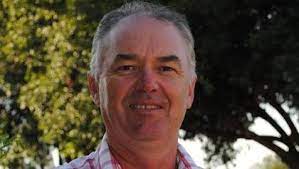
Producer Representative
Ian owns and manages a mixed farming enterprise at Koorawatha in New South Wales. His farming enterprise includes lamb (grass fed and feedlot) and steer finishing operations. His extensive experience on various sheep industry boards and committees has given him a comprehensive knowledge of sheep industry systems, markets, market access and food safety. Ian is currently a Director of Sheep Producers Australia and a member of NSW Farmers Sheep Meat Committee.
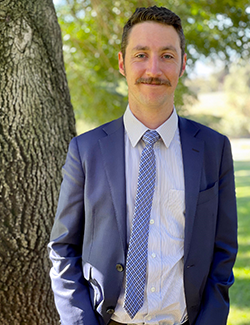
B. Bus M (Ag Econs LLS)
Alister is the General Manager – Strategy and Risk at Sheep Producers Australia. He is originally from the Gympie region in Queensland, originally working as a solicitor for agricultural clients before joining the Commonwealth Department of Agriculture and subsequently advising the livestock sector. Alister has worked with Australian Pork Limited and was the project manager and company secretary for PorkScan Pty Ltd - a research company working on the analysis of lean meat yield. Alister’s research for his Masters dissertation was focussed on maintaining a viable Australian extensive livestock sector in the face of constrained inputs.

BSc (Hon) MSc
MLA Representative
Joe is the Program Manager of Sheep and Goat R&D with Meat & Livestock Australia based in Western Australia. He has been with MLA since 2017 and is responsible for developing the national strategy for delivering research, development and adoption activities to improve the productivity and profitability of the sheepmeat and goat industries. Joe is also currently undertaking at PhD at the University of Western Australia focused on investigating strategies for reducing emissions and building climate resilience of agriculture in Western Australia.
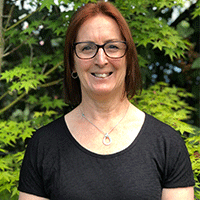
BSc Agric (Hon) PhD
Program Coordinator
Sue is the Director and Principal Scientist at Makin Outcomes, an independent research and development consultancy based in Orange NSW. Makin Outcomes specialises in applied research and development, project and program management, development and delivery of national livestock training programs, data analysis and reporting, scientific reviews, change management and technical editorial services. Sue has 30 years of experience in applied scientific research including genetic improvement of sheep, breeding ewe management and lamb and weaner survival.


